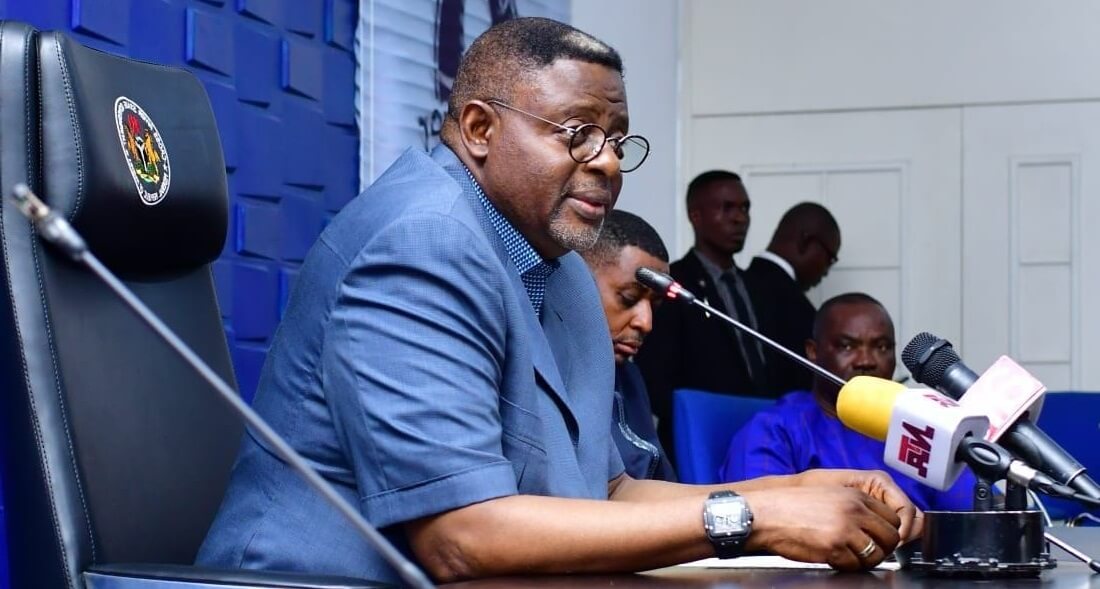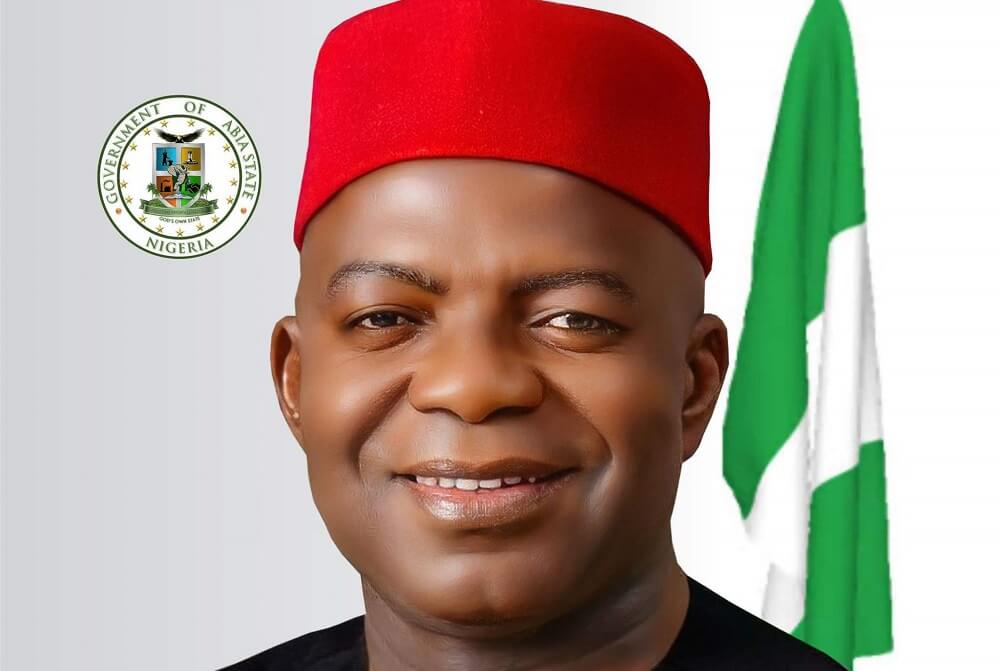Two Years In C’River: Infrastructure, Education Define Otu’s ‘People First’ Agenda

Two years into Governor Bassey Otu’s administration, a bold vision built on the ‘People First’ mantra is taking shape across Cross River State, with sweeping reforms and landmark projects spanning infrastructure, education, healthcare, agriculture, tourism, and governance.
From neglected roads and schools to a revitalized economy and reformed public service, the Otu administration has delivered measurable change.
“We came into office with a clear agenda: to restore dignity, unlock opportunities, and serve the people, not ourselves,” Governor Otu said during a townhall meeting to present his scorecard.
“Today, I am proud to say: we are not just keeping promises; we are transforming lives.”
Under Otu’s leadership, over 200 kilometers of road projects have been awarded across the three senatorial districts, with more than 70 kilometers completed. Projects include roads in Calabar South, Ugep, Ikom, and the strategic Akhreha–Okpoku Bridge in Yala.
“Before this administration, this road was a death trap,” Mrs. Affiong Udo, a trader in Ugep told THE WHISTLER during the townhall meeting. “Now, my goods reach markets faster, and my children get to school safely.”
The administration also completed key government buildings, including the Governor’s Office Complex, the Speaker and Deputy Speaker’s Lodge, and the Office of the First Lady.
It also ensured the completion of the abandoned Cross River State Local Government Civil Service Commission, and comprehensive rehabilitation and modernization of the Cross River State Newspaper Corporation (Ongoing).
Ongoing works include the Deputy Governor’s Lodge and Governor’s Lodge in Ogoja.
Transforming Education: Access And Quality
In what many have described as an “education revolution,” the ministry of education under Prof Stephen Odey laid a clear roadmap, anchored on access and quality. While bringing schools closer to the people by ensuring every community no matter how few their population is, their education must be of high quality.
This has led to increased school enrollment and recruitment of teachers.
The government covered WAEC registration for over 31,000 SS3 students in two years. The state achieved a 72.1% pass rate, ranking 4th nationwide.
“We are not just easing burdens,” Otu said. “We are igniting dreams.”
The state also built 26 new classroom blocks, rehabilitated 13, and distributed over 9,000 tables and chairs. Over 700 education officers were trained on digital systems, and 700 tablets were distributed.
“Coming fourth in WAEC and NECO is not enough for us in this government, we want to come first including in JAMB,” Odey told THE WHISTLER at the back of the scoreboard presentation. “We want to keep the investment going and ensure we achieve 95% literacy level before we leave the government.
“You can agree with me that with the progress we have made in two years, it’s attainable. We are not joking about this,” he said.
The change is resonating with the people. “I have been a teacher for 15 years, and I’ve never seen this kind of support,” Mrs. Christy Okon, a principal in Obubra told THE WHISTLER at the scorecard presentation. “This is not just change; it’s a transformation.”
In healthcare, Otu’s administration recruited 204 health professionals, commissioned two oxygen plants, established a Fistula Centre, and is building a General Hospital in Ikom. Through the Health Palliative Programme, pregnant women, children under five, and the elderly now receive free healthcare.
Mrs Janet Idagu, who delivered her baby at the Nyahasang Health Centre told THE WHISTLER at the event that, “I delivered my baby without paying a kobo. This is what good governance looks like.”
The digitization of health records, commissioning of automated Chemistry Analyzers, and the upgrade of four Schools of Nursing to Colleges of Nursing Sciences underscore the shift toward a modern, accessible healthcare system.
Agriculture: Subsistence To Economic Engine
Perhaps one of the administration’s most impressive achievements is in agriculture. Otu launched a statewide digital soil fertility mapping system, a first in the South-South region, enabling data-driven farming.
The government distributed 625,000 sprouted oil palm nuts, 24 metric tons each of rice and maize, and 600 hectares of cassava were cultivated. Through LIFE-ND and APPEALS Programmes, over 14,800 metric tons of produce were generated and ₦4.74 billion in income created, with 2,158 new jobs.
“We are not handing out relief,” the governor said while presenting his scorecard. “We are investing in productivity, dignity, and resilience.”
With 13.3km of farm access roads constructed and 14 agro-processing centers built, Cross River is fast becoming an agro-industrial hub.
The government began returning Cross River State to a tourist destination through purposeful investment. Once dormant assets like the Marina Resort have been revived, and the iconic Calabar Carnival has seen a 42% surge in attendance, generating over ₦14bn for the local economy. Tourist arrivals rose from 62,000 in 2023 to over 300,000 in 2025, with visitors from more than 40 countries.
Otu said, “We’re building a tourism economy that works for all. Behind every dancer, every vendor, every tailor is a dream we’re helping to realize.”
In the area of environmental and urban renewal is the administration’s sustainability efforts for flood control, beautification, and waste management. Over 300 hanging bins have been installed, green spaces revived, and daily street sweeping instituted in cities to restore the state to its most beautiful state.
The 125-unit limestone deposit is now under regulated development, creating jobs and enforcing mining laws.
“We have proved that governance can be green, humane, and people-centered,” said Commissioner for Environment, Hon. Moses Osim at the sideline of the scorecard presentation.
Very crucial to the administration is the need for institutional reforms to restore trust in governance. The administration said those who served the state must be rewarded.
To achieve this, over ₦10bn has been paid in gratuities to retirees.
It has begun digitization efforts across the Ministries and the Cross River Geographic Information Agency (CR-GIA) to improve land administration. The revived CROSPIL delivered 200 housing units and is constructing 400 more.
The Cross River State Development Plan, a first in the state’s history, alongside the domestication of the National Monitoring and Evaluation Policy, marks a major leap in institutional accountability.
Also, Cross River’s stunting rate has dropped from 25% to under 2%. Through collaborations with UNICEF and other key partners, the state has attracted over ₦35.4bn in development funding, earning top rankings in NG-CARES implementation.
“Cross River has gone from being a forgotten frontier to a frontrunner in data-driven development,” said Dr. Ini Edem of the State Bureau of Statistics.
Pledging to serve better and steady, the governor said, “We are building roads, but more than that, we are building futures. We are opening schools, but more than that, we are opening minds. The work has just begun. Together, we will keep moving forward.”
“We have brought social services closer to the people—women, children, the elderly, youth, persons with disabilities, and our most economically vulnerable are no longer on the margins,” said Otu, reflecting on the strides made under his ‘People First’ governance approach.
“We are building a society where empowerment and prosperity are not privileges, but rights.”
Two Years In C’River: Infrastructure, Education Define Otu’s ‘People First’ Agenda is first published on The Whistler Newspaper





